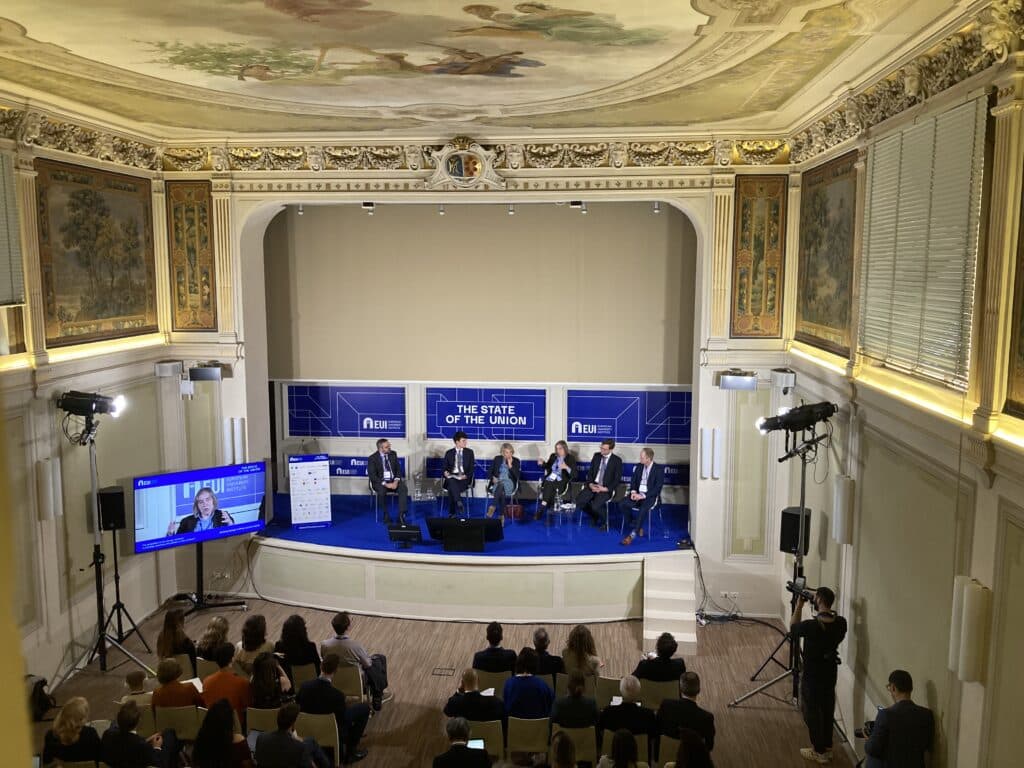The Energy Sector at the European Court
Highlights from the debate "Update on ECJ Case Law: Round Two"
Several recent judgments of the European Court of Justice have had significant repercussions for the energy sector and offered new insights into the wider interpretation of EU energy law.
Following our ‘Update on ECJ Case Law’ earlier in the year, in the third FSR Debate, we honed in on three important cases, which tackle issues of EU state aid, dispute settlement and explore the extent of the powers of regulatory authorities, before turning to a few interesting cases in the pipeline.
Our hosts Leigh Hancher and Alberto Pototschnig were joined by Liliana Eskenazi (Fréget et Associés), Fabien Roques (Compass Lexecon), and Francesco Salerno (GOP) for an in-depth discussion of these cases.
Case C-594/18 P
We first examined the latest developments in Case C-594/18 P: Austria v European Commission, a long-running legal saga surrounding the development of a new nuclear power plant at Hinkley Point in the UK, which sheds light on EU state aid rules and the interaction between the Euratom Treaty and the TFEU. As the Euratom Treaty does not contain state aid rules, to what extent do the principles of the TFEU apply when it comes to determining the compatibility of state aid to the nuclear sector?
In 2014, the European Commission approved the UK’s plans to give state aid to support the construction of two EPR reactor units at Hinkley Point C, deeming it compatible with EU state aid guidelines, and thus the internal market. The basis of their approval was Article 107(3)(c) TFEU, which states that “aid to facilitate the development of certain economic activities or of certain economic areas, where such aid does not adversely affect trading conditions to an extent contrary to the common interest” may be considered compatible with the internal market. The project, which is a joint venture between EDF and China General Nuclear Power Corporation, would be the first new nuclear power station to be built in the UK in almost twenty years, and would account for approximately 7% of the UK’s electricity supply.
In the rare move of one Member State challenging a state aid decision for another, Austria launched an appeal to this decision in 2015 on the basis that approval of the scheme contradicted the EU policy to support renewable energy. The then Austrian chancellor Werner Faymann argued that, “[State] aid is there to support new and modern technologies that are in the general interest of all EU countries. This is in no way true of nuclear power.” The case divided Member States. In the course of proceedings, Luxembourg intervened in support of Austria while France, Poland, Czechia, Hungary, Romania, Slovakia, and the UK intervened in support of the EC.
In July 2018, the General Court dismissed the action brought by Austria on the basis that there was no need to establish an EU-wide objective of common interest for the project or, surprisingly, to establish that the aid is there to correct a market failure. Furthermore, it was found that the Euratom Treaty principles are separate from those of the TFEU/ TEU, meaning that the principles on the protection of the environment do not apply to the Euratom Treaty. In September 2018, Austria appealed against the decision before the European Court of Justice.
Ahead of this final ruling, in a non-binding opinion of 7 May 2020, Gerard Hogan, Advocate General of the European Court of Justice, suggested that EU judges should dismiss the appeal by Austria. Taking a strict interpretation, he argued that Art 107(3)(c) TFEU does not predicate the compatibility of state aid upon it serving a ‘public’ or ‘common’ interest objective. Rather, compatibility need only be determined according to the potential of the aid to distort competition or trade. By accepting the objectives of the Euratom Treaty, all Member States have “clearly signified their unqualified acceptance in principle of the right of other Member States to develop nuclear power plants in their own territories should they wish to do so.” He also noted that EU law (via Art 194 TFEU) has given each Member State the right to determine its own energy mix. Hogan commented that the “case can be described as the legal side of a dispute between Member States that are in favour of nuclear power and those that are not. Both sides claim that they pursue their course with a view to protecting the environment.” Ultimately, according to Hogan’s interpretation, compatibility cannot be used as an instrument to effect positive integration.
In the subsequent ruling of 22 September 2020, the Court dismissed Austria’s appeal and confirmed that the construction of the power plant may benefit from state aid, as originally approved by the EC pursuant to Art 107(3)(c) TFEU and in line with AG Hogan’s opinion. The Court confirmed that in the absence of specific state aid rules in the Euratom Treaty, the state aid rules of the TFEU are applicable to the nuclear energy sector. The Court concluded that the compatibility of aid is not dependent on the pursuit of a ‘common interest.’ The existence of a market failure may be a factor in declaring aid compatible, but it is not a requisite for compatibility, according to the conditions laid out in Art 107(3)(c). Significantly, contrary to the General Court’s findings, the European Court of Justice’s ruling held that state aid for an economic activity, which contravenes environmental rules, cannot be declared compatible with the internal market. The same is true for the provisions of secondary EU law on the environment. However, in the same ruling, the Court noted that the EC is required to take into account the negative effects of the state aid on competition and trade between Member States only, and concludes that the General Court in its earlier ruling was correct in the interpretation that the EC did not have to take into account the negatives effects of the measures on the environmental principles. How does this tally? What can be deducted from this split conclusion with respect to environmental protection principles?
According to the ruling, the principle of protection of the environment, the precautionary principle, the ‘polluter pays’ principle and the principle of sustainability, cannot be regarded as precluding, in all circumstances, the grant of State aid for the construction or operation of a nuclear power plant.
This is because each Member State is free to determine the conditions for exploiting its energy resources, its choice between different energy sources, and the general structure of its energy supply, and thus may include nuclear energy as part of its energy mix. In other words, the grant of such aid is not precluded by the application of EU environmental law. An EU Member State’s choice to opt for nuclear energy within its energy mix is not per se in conflict with the objectives and principles of EU environmental law according to the judgment.
See the presentation slides
Case C-236/18
We next turned to the preliminary ruling in Case C-236/18: GRDF SA v Eni Gas and Power France SA of 19 December 2019 and the implications of the case on the interpretation of the role of regulatory authorities.
The case centres on a dispute between the gas supplier Total Direct Energie, the main alternative supplier in France, and GRDF, the French DSO, surrounding distribution contracts. Since the early years of the liberalisation of gas supply in France, suppliers have been bound by contracts with the DSO for the service of gas supply, which they then sell to the final customer. The dispute arose as, according to GRDF’s interpretation, once they had a contract with the supplier, it was the duty of the supplier to manage and absorb the costs of customer relations as well as the risk of unpaid bills – a considerable cost for new entrants or, as in this case, an alternative supplier. The supplier must then pay these amounts to GRDF, including what was unpaid by the end customer. Total Direct Energie brought this issue to the regulatory authority for dispute settlement, asking that they assess this clause of the contract. CRE’s dispute settlement and sanctions committee, CoRDiS, agreed that GRDF’s contract provisions were contrary to the applicable national regulations, and directed GRDF to amend the contracts retroactively. Accordingly, the supplier was only the intermediary and the contractual relations were directly between GRDF and the final consumer. Thus, the burden of customer management and unpaid bills should be on GRDF.
On 2 June 2016, the Paris Court of Appeal confirmed the CoRDiS decision. GRDF then brought an appeal to the Paris Cour de Cassation. The Paris Cour de Cassation referred a preliminary question to the ECJ, regarding the interpretation of Art 41(11) of Directive 2009/73. They asked if, when settling a dispute, the regulatory authority has the power to issue a decision which applies to the whole period to which the dispute relates, regardless of the date on which the dispute arose between the parties – in other words, if they have retroactive dispute settlement powers. The European Court of Justice, drawing on Art 18(1) of Directive 2003/55/EC and several provisions of Directive 2009/73/EC regarding the powers of regulatory authorities and the obligations of DSOs to ensure third party access without discrimination, considered it an issue of EU law. The ECJ concluded that there were issues of non-discriminatory access to the market and the burdens placed on alternative operators was a barrier to equal competition with incumbents. The question posed to the ECJ raised significant concerns. The protection of EU law offered by sector-specific regulation would be undermined if the powers of regulatory authorities were to be limited in time. If the national regulator does not have the power to eliminate the consequences of any incompatibility with EU or national law, the effectiveness of EU law itself is brought into question. According to the ECJ, it’s an obligation for national courts and administrative authorities to “give full effect to EU law, including by erasing the consequences of an infringement of EU law.” This gave rise to complex issues of retroactivity. However, the national court – the Cour de Cassation – was not called upon to rule on this as the case was subsequently settled between the parties.
Case T-479/11 and Case T-157/12
Finally, we turned to the judgment on state aid in another long-running case, jointly Case T-479/11 and Case T-157/12: French Republic and IFP Energies Nouvelles v European Commission, which was issued on 5 October 2020. The case concerned an appeal to annul the EC decision of 2011 to allow France to grant state aid to the public institution IFPEN on the basis that the legal status of IFPEN had changed. In 2006, IFPEN became an ‘EPIC’, a publicly owned industrial and commercial establishment, which meant it became a ‘legal person’ governed by public law with an economic activity, distinct from the state, with financial autonomy, but with competences which include public service missions – thus both economic and non-economic activities.
In its judgment, the European Court of Justice drew on an earlier EC decision in relation to the compatibility of state aid to an ‘EPIC’, in the case of La Poste, and the subsequent ECJ ruling on it. In the EC’s view, that status would confer an unlimited public guarantee from the state, which thus constitutes state aid. The organisation would acquire a selective advantage amounting to incompatible state aid when the recipient’s main activity is an economic one. The ECJ confirmed this analysis in their ruling. In the case of IFPEN, if there is a presumption of an advantage, then the EPIC status would be incompatible with EU state aid legislation. How far does the presumption of the existence of an advantage go? In its judgment of 5 October 2020, the presumption could find application for relations with banks and financial institutions and the relations between IFPEN and its customers and suppliers. However, in the latter case, the EC has to demonstrate that IFPEN can have a similar advantage as the one derived from the relations with banking and financial institutions. No real economic advantage was proven in this instance. Ultimately, the case revolves around the burden of proof.
See the presentation slides
Ones to watch
Very briefly, we also considered two ongoing cases. First, we looked at the state aid arguments in Case T-300/19: Achema and Lifosa v Commission, which concerns two large energy consumers challenging an EC decision approving state aid in Lithuania to power plants producing RES-based electricity financed via an RES levy imposed on large energy consumers. The EC had adopted the decision based on a preliminary investigation, without opening a formal investigation, as it did not have doubts as to the compatibility of the aid. Achema and Lifosa appealed this failure, arguing that it denied them procedural rights and failed to take into account the cumulative effect of a series of levies that have been applied to large consumers.
We ended by turning to Case C-705/19: AXPO Trading v Gestorde dei Servizi Energetici SpA – GSE, which centres on AXPO’s failure to purchase green certificates for imported RES in Italy and, in turn, on whether green certificates should be deemed a form of state aid. The AG’s opinion is expected on 3 December in what promises to be an important ‘one to watch’.






